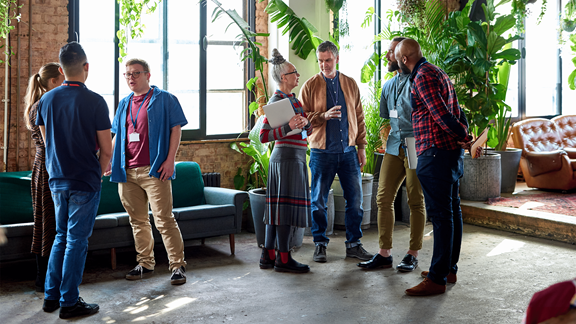Digitization and sustainability were high priority topics for Kin + Carta at Vision 2045, the leadership summit running alongside the 26th United Nations Climate Change Conference (COP26) in Scotland, which sought to advance the global discourse around the 17 Sustainable Development Goals (SDGs) of the United Nations.
What will endure as a result of the conference is the conversation of collaboration: how can we take responsibility as businesses and individuals to combine our efforts and make sustainable digital transformation our legacy for future generations?
The two initiatives - sustainability and digital transformation - can no longer exist independently. Our digital solutions must be sustainable if we are going to create a better world than the one we inherited, but it’s important to remember that no two sustainability journeys are the same. Now is the time to learn from each other, to educate each other, and to help each other in our collective quest to build a safer, fairer, better world.
For our CEO, J Schwan, and Client Director of Sustainable Business, Jennifer Crowley, the pursuit of sustainable digital transformation was the dominant theme of their conversations at Vision 2045. Let’s take a look at our reflections on the summit as a whole:

Taking collective responsibility for sustainable digital transformation
The impact of digital
One thing that became abundantly clear in Scotland was that the answer to our problems for people and the planet is not a bull rush to digitization. It’s going to take a cautious approach to make sure that the digital systems we build don’t create more problems than they solve. We have to be intentional about our impacts on the world around us, from the code we write and the platforms we build to the energy we use to get there.
Sustainable digital transformation is about “doing the right thing by building the thing right,” so, as responsible businesses, we must make use of the likes of tools and platforms to track the actual impacts of the digital solutions themselves. We must ask sustainability-driven questions at every point of our processes to make sure our end-products do more good than harm.
Inclusion, inclusion, inclusion
It’s long been our belief that a digital-first world doesn’t work better unless it works better for everyone, so it was encouraging to see inclusion and diversity featured so prominently on the agendas of other businesses at Vision 2045. This is an absolutely critical element of sustainability, from reducing algorithm bias to increasing representation and access to digital solutions.
The future of innovative, digital products and experiences must be firmly focused on inclusion and accessibility if we’re going to live in a world of equal opportunities. No business can survive or thrive if it shuts out swathes of potential customers and employees, simply because it doesn’t design with empathy.
The reality is that the digital divide—the gulf between people who are helped by the Digital Age and people who are hindered—will grow wider if we don’t turn oversights into insights that make our products, experiences and organizations genuinely better.
It takes a great deal of introspection to address this, as Jennifer discussed in her panel on Reduced Inequalities at the summit. We need to be prepared to ask ourselves the difficult questions as organizations to expose our vulnerabilities and remedy them if we are to build an inclusive world. How welcoming are our workplaces to people who identify as LGBTQIA+? How diverse are our workforces? Are there pay inequities that need to be resolved?
When we change our mindsets and commit to making a difference with every decision, whether it’s a speaking up for a coworker or a recruitment process overhaul, we can collectively make the world a better and fairer place.
The role of both private and public businesses
Both Vision 2045 and the concurrent COP26 proved that there’s a real need for collaboration. Ed Gillespie, Greenpeace UK Director, hit the nail on the head with his opening line on day three in Scotland: we should “focus on ingenious collaboration over intense competition.”
Sustainability is on the global agenda because every organization in every vertical, whether private or public, is responsible for its impact on the planet, so it’s critical that we work together on advancing the UN’s SDGs. We need to collaborate to create better supply chains, find more opportunities to share resources, and take heed of innovations in industries other than our own to make true progress.
It’s not only about holding ourselves accountable, but holding each other to account, too, when it comes to creating sustainable business models and practices. Organizations and governments alike are under greater scrutiny than ever, so transparency and accountability will help us all pull in the same direction as we work together towards a more accessible and sustainable world.
Let’s collaborate
Our recent B Corp certification in the Americas and Europe means we’ve set in stone our commitment to protecting people and the planet. Becoming a B Corp is base camp for us, though—there’s a long climb ahead to a future of responsible business and, as we set out after Vision 2045, we don’t intend to go it alone.
We’d love to hear from you about your visions and desires to bring sustainability and digital transformation together into one cohesive, collaborative strategy. Get in touch today to discuss how we can work together to build a world that works better for everyone.
Learn more about Vision 2045 and explore more insights from the summit here.